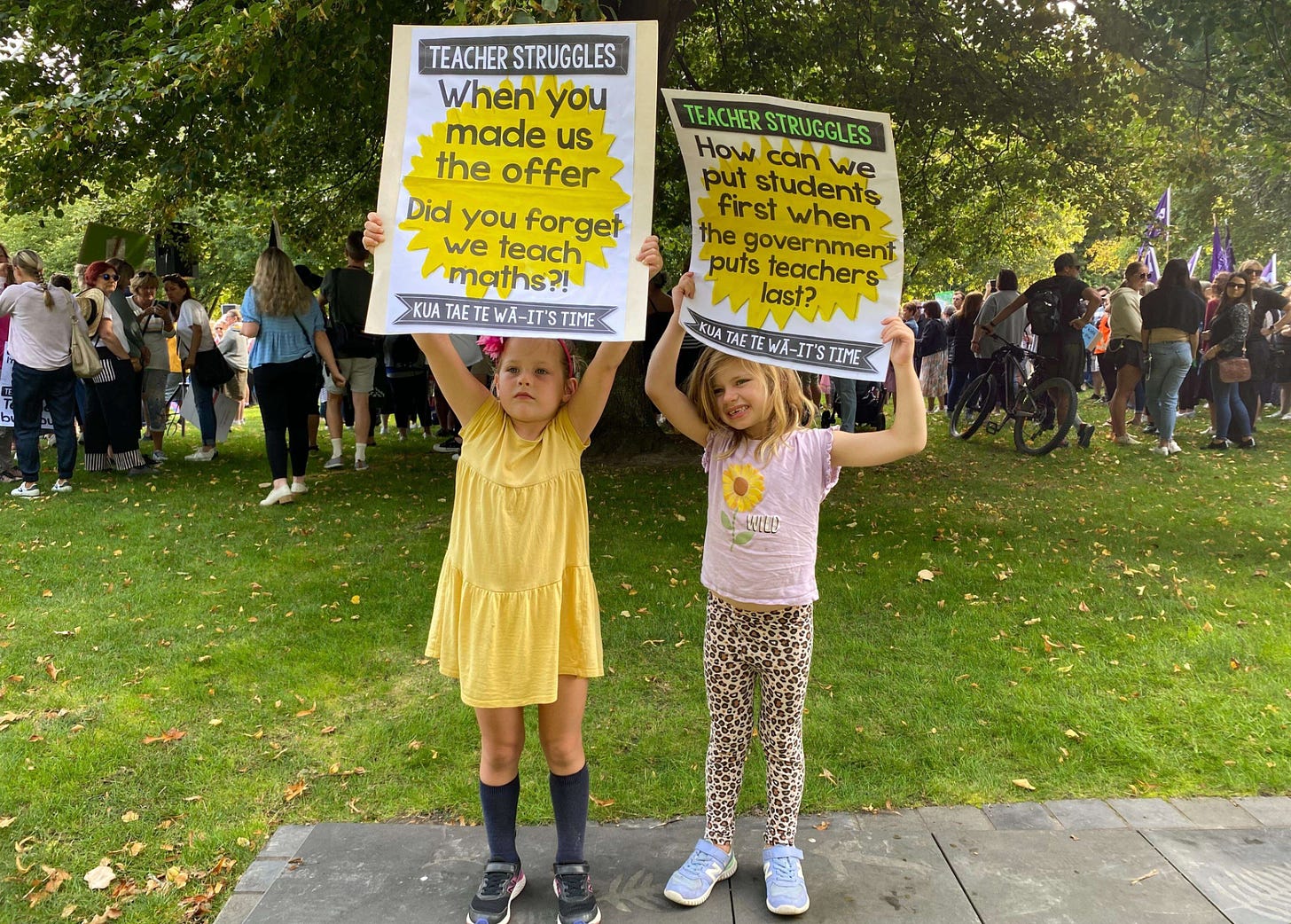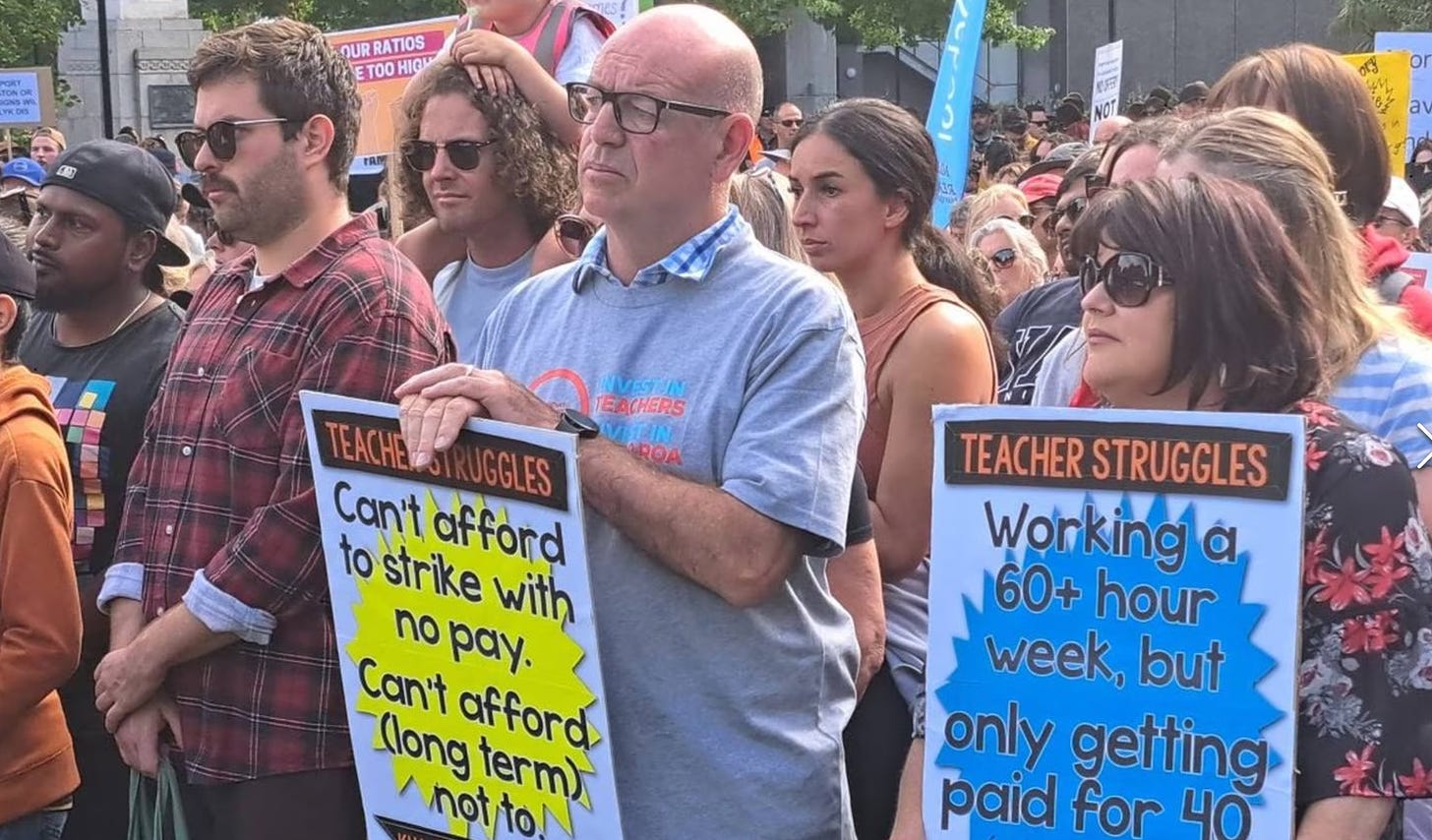So the teachers are on strike, marching across Aotearoa today to press their demands for better pay and working conditions.
Children remained in bed this brisk morning, many no doubt quite pleased about a day off school. Parents perhaps taking the day off to look after the kids, or working from home if they can. For some the only thing difference they notice will be lighter traffic with fewer cars.
No doubt there will be some that grumble about the protest - the kids have missed too much school already, everyone wants a pay rise with the cost of living, didn’t you guys just strike a couple of years ago? Didn’t this get sorted then? Or, who the heck can I get to look after my kids?
This is the first time I’ve felt a bit concerned writing on a topic that I don’t know enough about. I come from a family of teachers, my mother was a senior lecturer in Early Childhood Education (ECE), my daughter a primary teacher, my sister an ECE teacher. I have friends and family who are primary teachers, and secondary teachers.
As a parent of kids who’ve gone through all levels of education I have some idea. But I’ve never worked as a teacher myself and I was wary of trying to understand the problems teachers have, and communicate them, in the time between yesterday’s column and the one tomorrow. So I asked some folks about their thoughts, some having been in the teaching profession throughout their careers, some relatively new.
In this newsletter you’ll find quotes from these folks, I’ve left them mostly anonymous. I’m grateful for the insights they offered. I couldn’t have reached anything like their understanding of the situation without spending a long time researching, or realistically having worked as a teacher. Thanks to those who helped.
Please also note that this newsletter is about teachers. That doesn’t mean I don’t think we also need to see significant action taken for other sectors, for nurses and caregivers, this just isn’t about those other sectors.
So why are teachers striking?
From all the comments I received it seems this is definitely not just about money, although that is important too. It is about workloads, class sizes, paperwork and other frustrations as much as it is about pay. A number of people indicated that they were actually happy with the pay on offer, it was the conditions they were unhappy with.
Some people were unsure about the strike. Concerned that with everything over the last few years kids had already missed a lot of class time with lock downs and lurgies. Also with parents in their community already under pressure they were wary of adding to that with additional childcare demands. But most people I’ve communicated with are fully supportive of the strike. Something has to be done.
I support the teachers, and am emotionally there with them as they march. Physically I'm not, because I'm still in Covid isolation! I have retired from full time teaching but still relieve, and more than ever I see that funding is insufficient and poorly directed. I could write a thesis! Anyway, go the teachers. You rock!
We all know a teacher who feels overworked and underpaid. A low salary with a high expectation of additional hours to complete the work. We might also know a teacher that has had enough, some that have changed careers for better money or a better work life balance. Those who would now discourage others from following them into a career they once loved and are demotivated to continue in it themselves.
I am one of the thousands of teachers who will never return to teaching fulltime due to the workload. I am passionate about my job but not willing to work for free to the detriment of my family and health. I think the most significant changes to reduce workload would be to reduce class sizes, have more teacher aide support for the complex needs of a classroom, more classroom release time for planning and less ridiculous paperwork that mostly serves to continuously prove that I am a professional and capable of doing my job.
A reasonable payrise to cover the increased cost of living and repay my 40k student debt would be a bonus. Even as a part-time teacher I still find myself working an extra 30% unpaid to keep up with paperwork.
The quote above is from my daughter, and it breaks my heart. She is exactly the sort of person we want teaching.
I remember how proud she was, and I was, when she started her first teaching position. I recall going to our local library once when she was starting out and her excitement at seeing books being thrown out on sale that she could buy with her money to take to her classroom for the kids.
For too many years we have relied on those in the teaching profession following their career because it is something they love and care deeply about, even as they have become more and more underpaid. There is a limit. What a waste if these passionate people who so want to teach, to give to our communities, end up moving into jobs in offices, or selling things, to achieve a better life for themselves and their families.
A teacher I know posted that she’d seen a pay slip from her mum from the 1980s and in terms of dollars it wasn’t that different to today. Note I’m not talking about salary adjusted for inflation I’m talking actual dollars!
It’s a bit nuanced. The 80s payslip only shows the gross amount and doesn’t itemise any tax. But the gross dollar value was a little bit less than my net dollar value last year when I was on step 7 (incorrectly it turns out). She was on the top of the scale at that point. I’d expect a bigger difference in 40 years.”
Can you imagine that? It is hard to believe that there would be many sectors paying people in the same ball park, dollar for dollar, 40 years later. That’s outrageous. For context the median house price for New Zealand at the end of the 1980s was $100,000. It is a bit more than that now.
No one thinks of a favourite accountant or a favourite plumber. But even many decades after you were a student you will remember a teacher. One that took an interest, pushed you to give something a go or believed in you or your dreams. If you’re a parent you probably have teachers that have taught your kids, influenced their lives, who you are hugely grateful for.
I recently posted about my middle boy starting University. Two of his primary school teachers and the school principal of the time commented with their support and thoughts - that spoke volumes to me of the commitment and passion of these professionals. Our family has been bloody lucky to have them. But they too are worn down.
The MOE just keep coming back with the same offer. There is a crisis in education but it’s not so much the money, it’s about the lack of support for teachers and children in terms of special needs support, speech language teachers, educational psychologists, teacher aides, lower class sizes.
For primary teachers, having release time to do one to one teaching and never ending individual assessment, is important. Primary teachers get one hour per week…secondary teachers get one day per week
There is an overloaded curriculum which is continually added to, but nothing is taken away…just constant change and pressure.
If you would like to read an “Explainer” about the strike, covering in more detail what is sought, what’s on the table from the government, etc. then I recommend this excellent piece from Emily Writes:
So what should we do?
It was suggested to me that the following would be a good starting point:
Complete clean out of MOE
New principals to be appointed by a professional body not BOTs
Moratorium on any new curriculums for two years
De clutter the curriculum and lessen the paper work with a high trust model
Introduce performance pay or make it easier to get rid of poor teachers and principals
Offer scholarships to train as speech language, psychologists, counselors,
Special needs advisors etc
Lower class sizes.
Pay realistic salaries
I think somewhere along the line we were fed a line that government jobs were less important than ones in the private sector. One set makes money and the other generally doesn’t - and money is what matters right? It’s how we measure value.
But maybe it’s the other way round. Maybe the jobs that really matter are the government ones, the ones that provide us with health and education and the other things we need for our lives. And maybe some of the things happening in the private sector, and making money, are things that are not really all that important by comparison, like insurance or banking.
Other sectors work hard to eliminate unnecessary form filling, streamline processes through constant improvements, and are focussed on a decent work life balance. It is simply unacceptable that we act like we don’t trust our teachers, having them spend long hours on ass covering, or pointless, paper work.
In the industry where I spent most of my career, software development we used to have many of the same problems. There was a tendency to ass cover, to produce vast quantities of documentation that did nothing to add to the functionality delivered but was solely to show all reasonable steps had been taken if something went wrong and also to keep customer/supplier from taking each other to court.
A couple of decades ago we started moving to a more agile way of working, where there was a real focus on doing things that add value. Producing software over producing documentation, or in this case spending time teaching over paperwork.
There was also recognition that having people work longer and longer hours was not working, we had to be realistic about what priorities were and where we spent our efforts. People couldn’t code to a high standard 8 hours a day, they certainly couldn’t do so for 12 hours a day. A shorter period of really focussed effort produced better results than long hours which lead to errors being made and very unhappy employees.
I don’t know to what degree people have attempted to modernise working practices in the teaching sector. But it appears to me that the way the sector is run doesn’t allow for these sorts of improvements. So far as I can see a teacher or a principal does not have the ability to say - actually that paperwork task is a waste of time, no one reads it, it doesn’t help us educate children so we’re going to prioritise these other things instead. Maybe things need to be run differently.
An awesome teacher I worked with wanted to have a small group of students build a small fire with an extra adult for supervision, as an extension of the novel they were reading and to build into a writing task. Of course she had to fill in a risk assessment form for this, in her evening off.
Many would just do a simple lesson instead cos it's not worth the headache. Yet we have such high rates of students, particularly boys, failing literacy, which I personally feel is often due to not being engaged in uninspiring, repetitive tasks.
If you’ve been a parent of schoolchildren in recent years you’ll recognise this. Some of the forms we fill in are up to half a dozen pages - just for an activity that teachers once upon a time wouldn't have considered even running by someone else. How demotivating must it be for a teacher that wants to make an extra effort but gets punished with ass covering paper work.
I have some confidence in the Government. Prime Minister Chris Hipkins was recently the Minister of Education. Current Minister of Education Jan Tinetti had a long career as a teacher and a school principal and has said she has “huge respect for the work our teachers do and am disappointed about the breakdown in negotiations”. They will be well aware of the issues that teachers have.
Some people ask why the teachers take these actions when Labour are in charge - why didn't you kick up a stink when National were in charge and were doing less? I think the reality is if teachers are going to achieve decent change it has to be done under Labour because National simply won't.
But I’m not convinced Labour will make the changes necessary, negotiations have broken down even with relatively modest demands when we actually need to be bold and really shake things up.
For example how about the following?
Cap teachers hours at 40 per week, anything more than that teachers have to agree and be paid overtime. We have salaried professionals in other sectors who are simply expected to do additional hours, but they are typically paid high salaries in return.
A ruthless review of the paperwork demands on teachers. We should be doing what adds value and stop spending time on things that don’t add value, be it paperwork, or long meetings for example. Be realistic about all the things a teacher has to do and resource accordingly.
I definitely support them. I have two teacher daughters, and I worry always that they're going to burn out. It's just too much now. Such a lot of energy is spent in the classroom dealing with behaviours and violence. Teachers want to teach, but they have to be everything. They need help.
A pay rise, not only to keep pace with inflation but actually to address the long term fall in the value of a teacher’s salary. Let’s say 20% across the board. If a teacher was on $70k they would go to $84k, a senior teacher that had topped out at $90k would go to $108k.
Big changes sure, but I’m talking about salaries that the people who are teaching would be quite capable of earning if they left for the commercial sector. I think most people would support it, they know how hard teachers work, and they know damn well that they are underpaid.
But wouldn’t the government lose the election? No, I don’t think they would, I think saying we’re taking a bit more money from high earners to pay the people that teach our kids, is something a lot of people would agree with. Besides which the people earning over, say, $150k that currently vote for the government already know that they need to pay a bit more tax to have the society we want.
A society where our hardworking teachers are valued and trusted. Paid enough to afford the sort of standard of living hard working people in this country should expect. One where they are not spending their family time doing paperwork that leaves them tired, frustrated, and ready to leave teaching.









Yes, a good assessment of things, but noooo to performance pay. It's just not an even playing field and would be impossible to regulate.
As an elderly, long serving primary teacher/principal, with two teaching daughters, I am somewhat reluctant to state views which will be seen as "the good old days" because they weren't always, however there are times in the history of education where teaching was delivered some very bad consequences. Firstly, in my view Tomorrow's Schools gave politicians the ability to become too involved in curriculum matters and the internal operation of schools. Teaching at this point became a profession that everyone knew how to do better than those who were trained for the role. Then the politicians applied "accountability" so that teachers were subject to appraisal systems that were time consuming, recording processes that were way too time consuming and meetings and meetings and meetings. Finally National Standards I feel was the final straw with even more recording, testing etc etc that took away from the time teachers enjoy spending with their classes. Teachers of course deserve more money, they also deserve more support for the many more students who find school a hard place to manage nowadays and primary teachers also deserve non contact time to match that enjoyed by their secondary colleagues. We from the NZEI marched a long time ago for equal pay and equal conditions and they have not ever really been realised. Long rant in support of all of those teachers out there with the hope that Jan Tinetti can indeed provide a fair outcome.